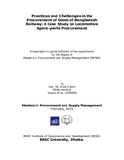Practices and challenges in the procurement of goods of Bangladesh Railway: a case study on locomotive spare-parts procurement

View/
Date
2015-02Publisher
BRAC UniversityAuthor
Islam, Md. AnwarulMetadata
Show full item recordAbstract
Bangladesh Railway (BR), a principle transportation agency of the country, is a Government–
owned and Government–managed organization. It operates and maintains the entire railway
network of the country. The vision of BR is to provide safe, reliable, cost-effective, and timeefficient
rail transport service in the country through modernizing, expanding, & maintaining
rail system in a manner which supports government strategies for economic, social, &
environmental development. To support the vision, BR has to procure goods to maintain &
upgrade locomotives, coaches & other rolling stocks.
There are about 242 locomotives in the locomotive fleet of BR. To maintain these locomotives
BR has four locomotive workshops: One central locomotive workshop at Parbatipur for overhauling
locomotives as heavy schedule maintenance and three diesel workshops at Dhaka,
Chittagong and Parbatipur for medium schedule maintenance. To provide necessary
materials and spares required for the daily maintenance works in the workshops, BR has a
centralized procurement system under the Stores Department headed by the Chief Controller
of Stores (CCS). The Stores Department is responsible for maintaining the whole supply
chain of BR as it is solely responsible for the procurement of all goods (production materials
as well as MRO supplies) required by the different user departments of BR. BR has to
manage a inventory of more than 30,000 items, of which more than 26000 items are for
locomotive spare-parts. A considerable percentage of the locomotives have passed its
economic service life. Non availability of the spare-parts is a major issue in the locomotive
maintenance works. That is why the procurement of locomotive spare-parts is crucial
and challenging for the Stores Department of Bangladesh Railway. And this dissertation was
focused only to the procurement of locomotive spare-parts, by the Chief Controller of Stores,
Bangladesh Railway, required for the Pahartali Diesel Locomotive Workshop.
The specific objectives of the study were to identify current practices of procurement,
challenges faced in procuring diesel locomotive spare-parts, understanding the current
consumers satisfaction level in terms of ‘on time in-full (OTIF)’ delivery and finally to suggest
ways to improve the performance of procurement function and enhance the consumers
satisfaction.
The objectives of the study were achieved through three approaches; the first one was
questionnaires that were obtained from respondents’ of the procurement office (CCS office),
the consumers (Diesel Workshops) and experienced officials of BR who have worked in the
procurement of loco-spares and maintenance of locomotives. The second one was studying
some practical procurement cases of CCS office. The third one was key informant interviews of procurement officers and staffs of CCS office as well as executives of consuming
departments.
Questionnaires were prepared to know the general perception and attitude regarding
inventory management, to evaluate the strategic factors affecting the demand of spares,
choice of procurement method and strategy, the impact of regulations on public procurement
(The Public Procurement Rules, 2008), category management and to evaluate the use of
information and Communication Technology at central procurement office and to determine
the level of satisfaction in terms of spars availability and so on.
After getting the response from the respondents’ from questionnaires, practical experience
and key informant interview, they are analysed in light of the objectives of the study and then
the study recommends some of the key areas for improvement of procurement management.
The researcher recommends a number of possible ways for improving areas to procurement
management like organization and management, portfolio segmentation, sourcing, introducing
sustainable tender and contract terms supplier base optimisation, relationships development
and management with key suppliers, personnel management, introduction of ICT, contract
management and Business Process Reengineering (BPR). The researcher believes that if BR
considers and implements those recommendations in procurement management, certainly,
the delivery performance will be improved considerably, and thereby, consumers’ satisfaction
will also be increased.
